| Casey Jarrin |
In the Mood for Love plays at the Trylon Cinema from Sunday, May 7 through Tuesday, May 9. Visit trylon.org for tickets and more information.
i. I wonder how it began
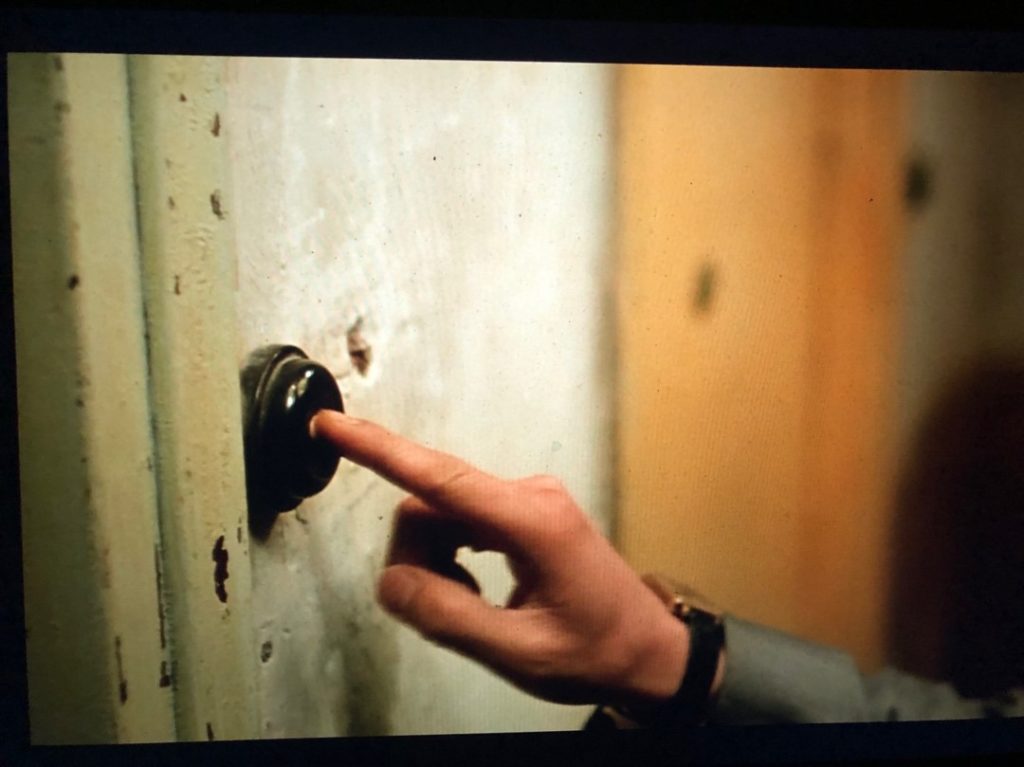
A single finger pressing a doorbell: Mr. Chow (Tony Leung)
Hand grazing a doorframe: Mrs. Chan (Maggie Cheung)
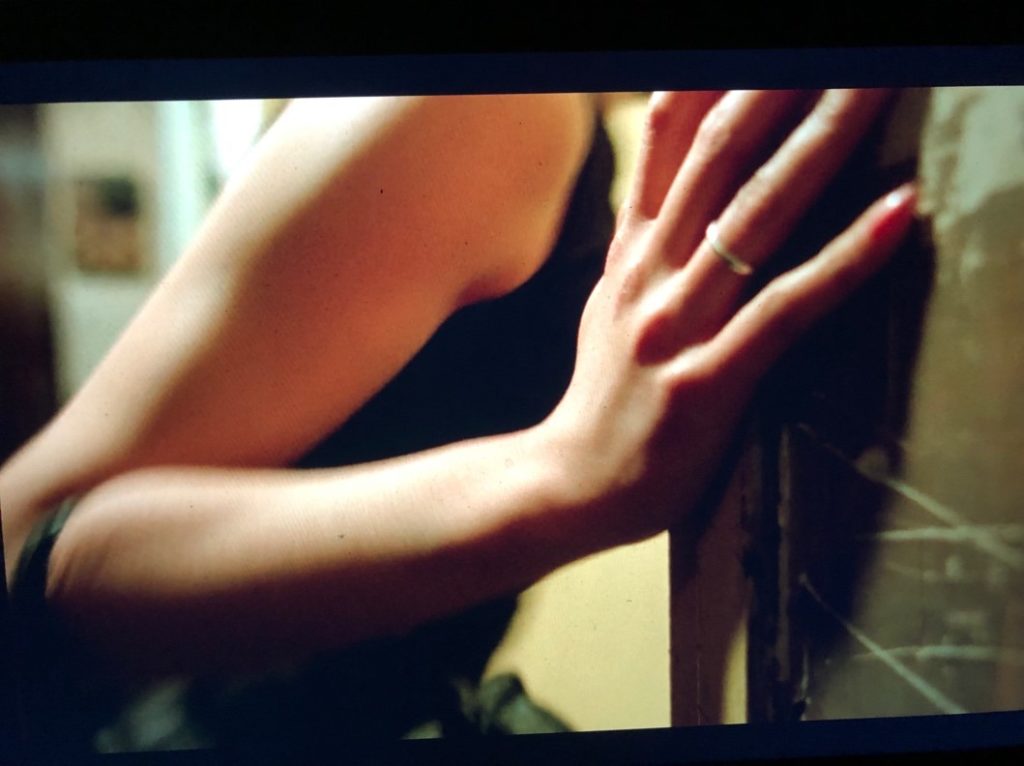
The erotics of a single finger
pressing the doorbell
slowly
Quiet intimacies of space
slender hands graze
a forgotten doorframe
Wardrobes
lifted by ropes
A slash of fabric
midnights of rain
Every frame: a sigh
a wish held close
a silent exchange.
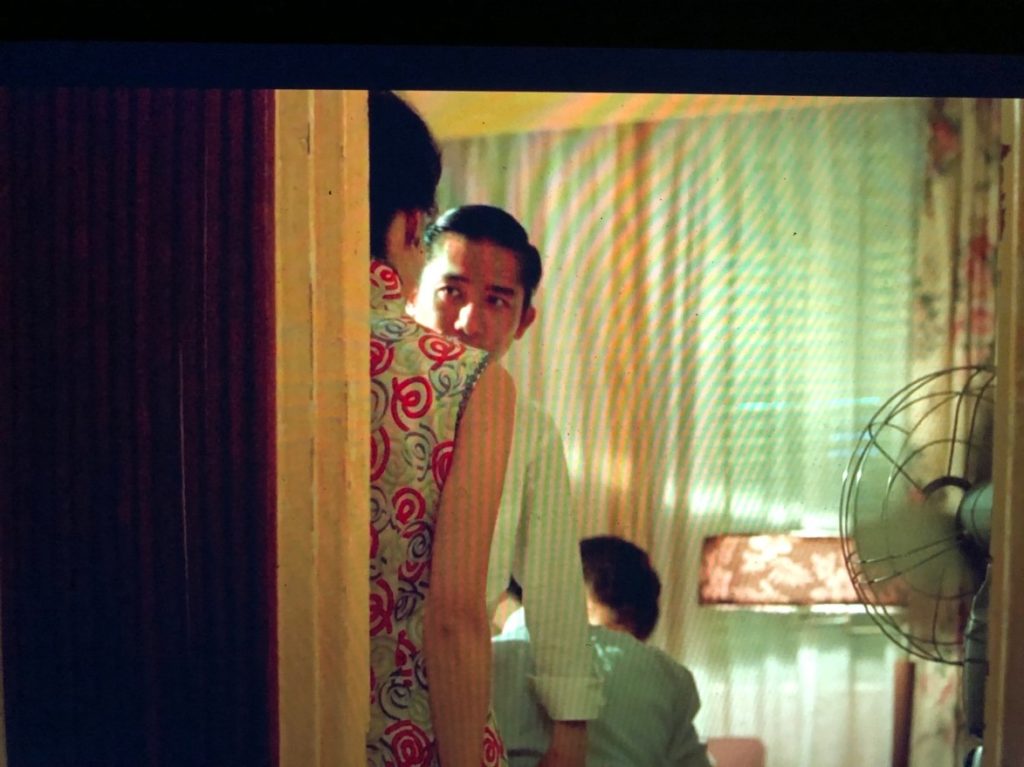
Electric currents in the spaces between bodies.
ii. you bottle things up
To enter the dance of Wong Kar Wai’s In the Mood for Love is to witness the spaces between breath and flesh, to linger in the threshold between architecture and damp air, to inhabit a place of electric hesitation. The audience, a hummingbird floating waiting watching
on the other side of window glass.
Here: fabric melts, glances dance and bounce off alley walls, skin waits.
We play witness then join in a visceral cinema of longing, palpable through the screen.
iii. we can’t all be Maggie Cheung
I sat in Theatre 3 at Lincoln Plaza Cinemas on Broadway and 65th and sighed. I couldn’t get my legs to move, to pull me up out of the chair, to want to leave. I was full of dreams, like I’d been swallowing celluloid for hours instead of the fancy ham sandwiches they sold in this subterranean theater. I could feel the subway roaring in my bones.
Still in its spell, I sleepwalked to the bathrooms, twirled up a new red lipstick, swooned at myself in the mirror. For a moment I became my own lover and took a closer look.
iv. that era has passed
In the Mood for Love drips with Hong Kong. I had a friend in college who’d grown up there. He wore round wire-rimmed glasses and wanted to be a filmmaker. He spoke quietly, if he spoke at all. He told me about a film he’d started to make about his parents’ love story, shot using Super 8. I wish I’d kissed him then instead of waiting. Though maybe he was a messy kisser and we just wouldn’t have meshed.
Regret isn’t the same as loss not always
v. you notice things if you pay attention
Movies teach us how to see the world, experience our bodies, feel big things.
The camera eye of In the Mood for Love‘s dual cinematographers Christopher Doyle and Mark Lee Ping-Bing is both desiring machine and another body, a character alive within the screen who makes choices about what and where we see.
Voyeuristic horizonal pans
we squeeze our way
devouring Tony Leung’s eyes
all synchronized, inevitable
composer Shigeru Umebayashi’s
slow motion soft focus rain
up and down that staircase
Maggie Cheung’s silhouette
driven on by relentless percussive strings
not-quite-adulterous suite.
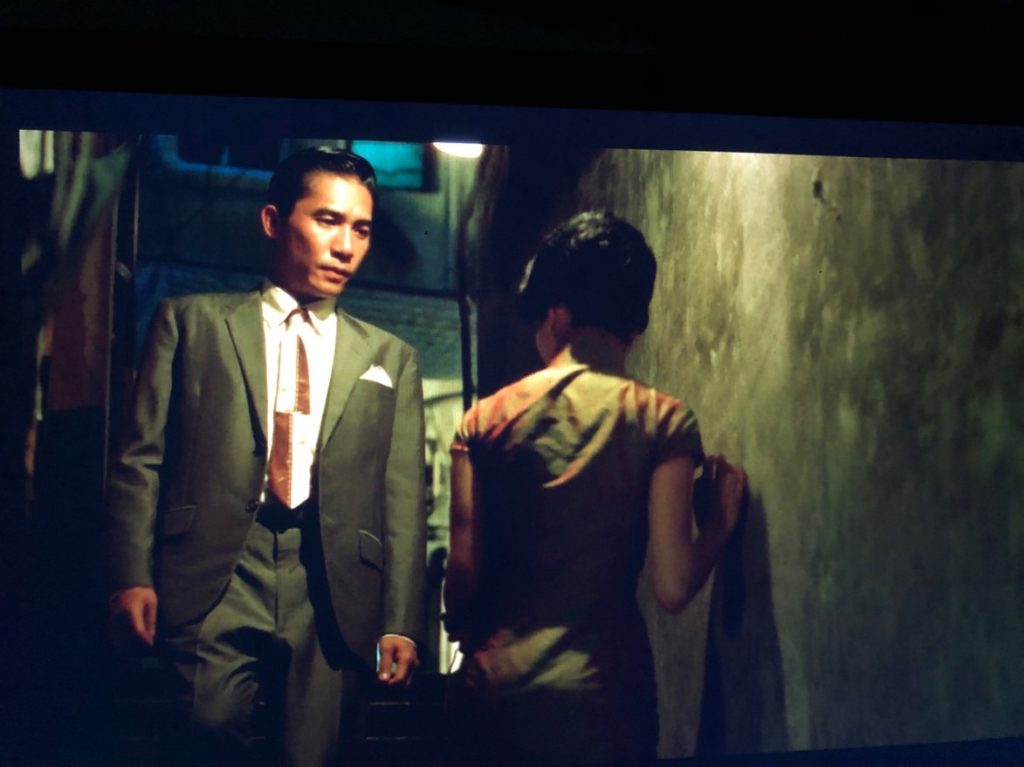
The stairwell ballet.
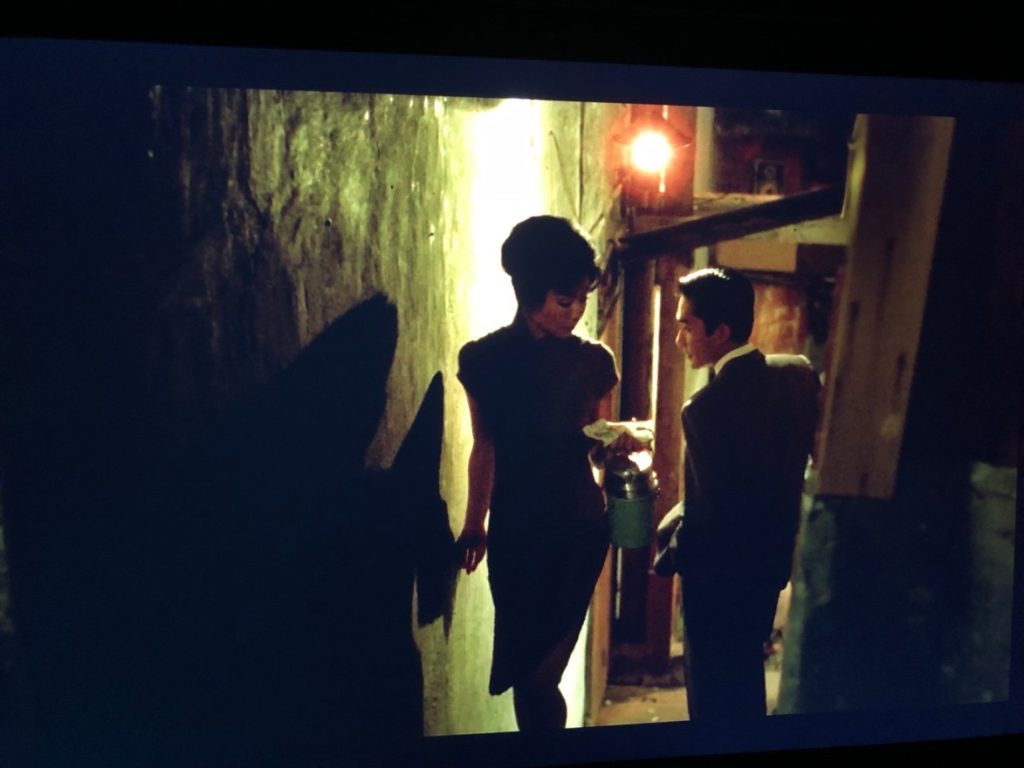
vi. how to feel (each frame, a painting)
In the Mood for Love trained me to seek out exquisite pain on screen.
Like some visual-acoustic-olfactory mashup of Peter Greenaway’s
The Cook, The Thief, His Wife and Her Lover
its steaming pots and viscera stews bubbling
and Pina Bausch’s Tanztheater
a choreography of muscles and lungs
limbs in Wim Wenders’ Pina
together we sweat, breathe uneasy
ache and wiggle our weary feet.
In the Mood for Love also taught me everything about regret, which isn’t the same as loss.
I learned to relish the long take:
to desire a shot that lingers
beyond action
uninterested in dialogue
the residue of two bodies
occupying the same space
an absence felt within the frame.
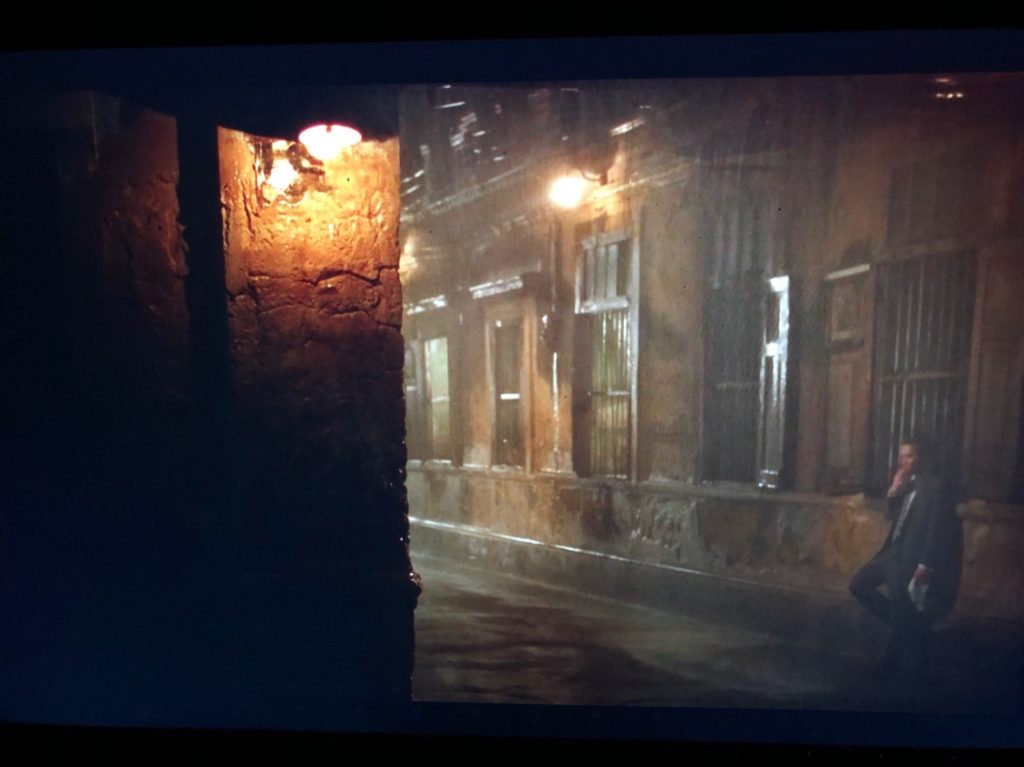
Wong Kar-wai does Hopper in the Hong Kong rain. Diagonals, night city, waiting.
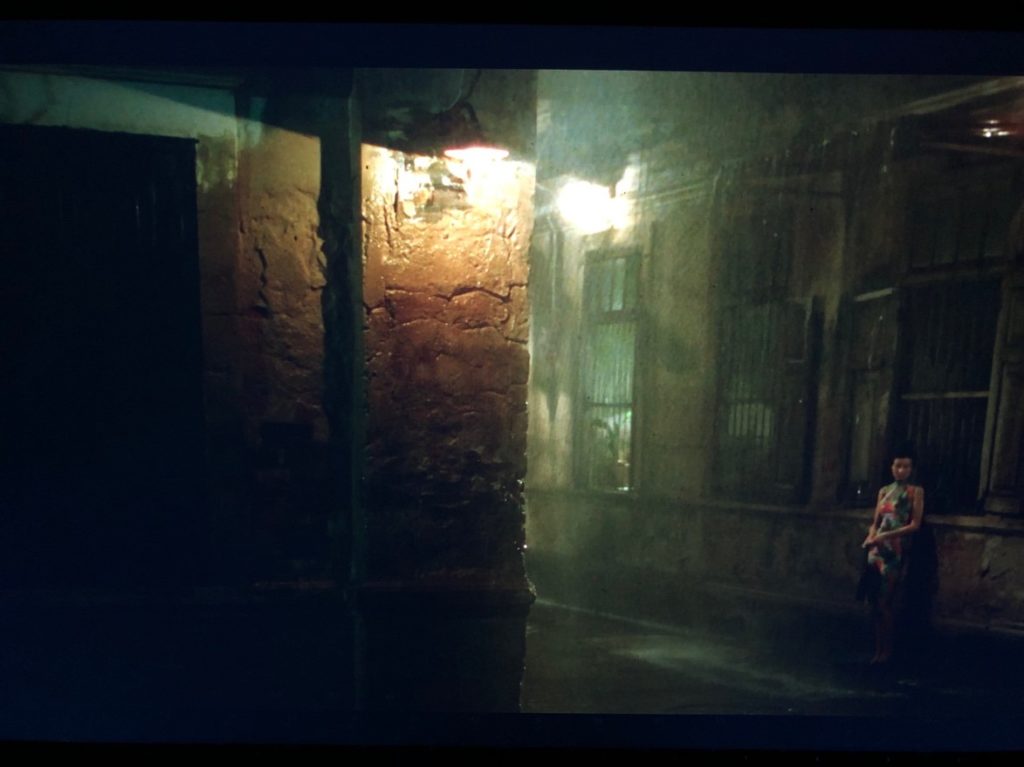
vii. not now
Maybe someday I’ll write that essay comparing In the Mood for Love to Hiroshima Mon Amour and decide that Marguerite Duras was the screenwriter for both and Wong Kar-wai’s collaborator all along.
viii. never alone | never whole
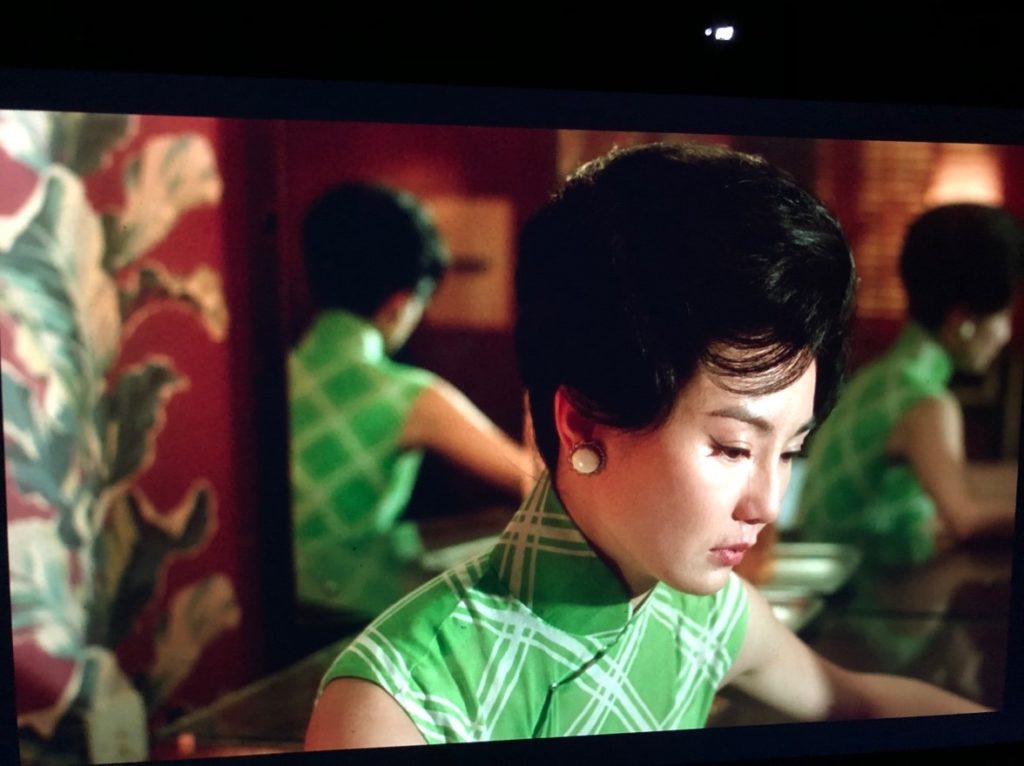
Tears in triplicate: always visible, never alone.
seeing in duplicate and triplicate:
Mr. Chow and Mrs. Chan never alone
double shadow, mirror triptychs
fractured screens, no one is whole
doorways frame silhouetted bodies:
the opening shot of The Searchers
the break-up in L’Eclisse
(Tarantino copied them all)
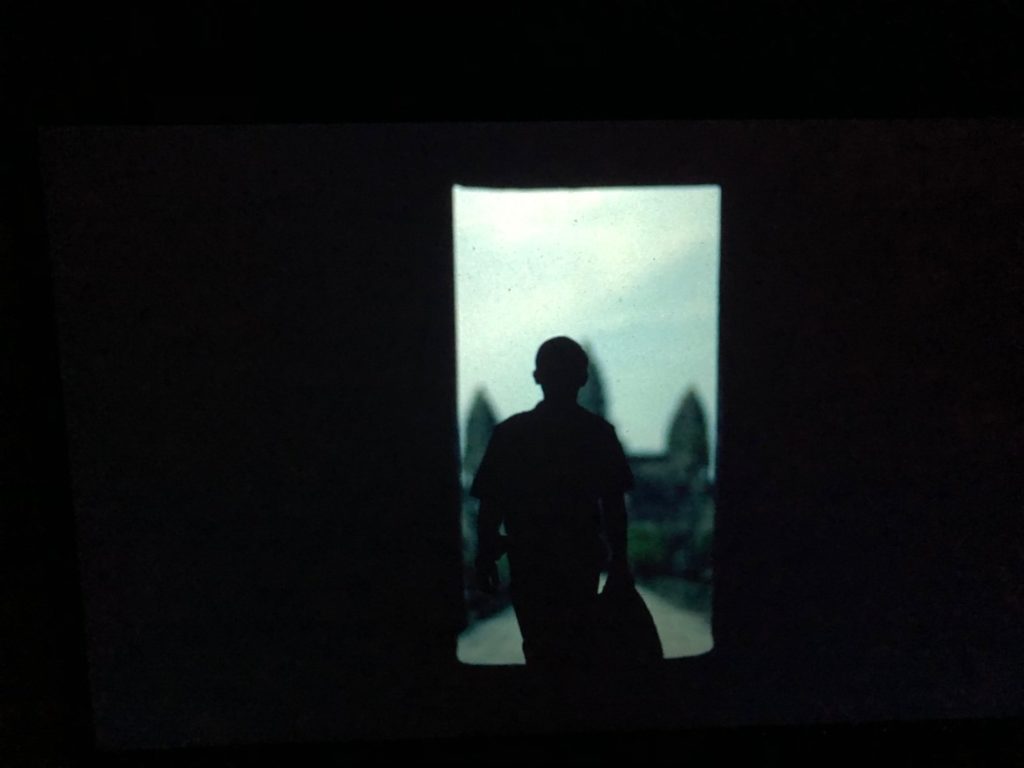
Bodies in the cinema frame, in doorways, on the threshold.
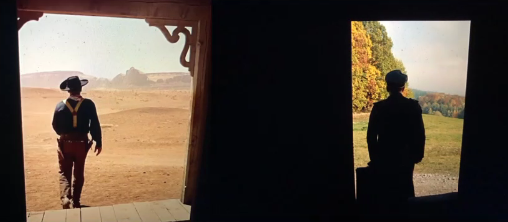
ix. you notice things if you pay attention (Quizás)
The stairwell.
The alley.
The corner.
The rice cooker.
The all-night mahjong game.
The lamppost.
The rain that never ends.
The dark but not blackened sky.
The negative space between elbow and ribcage as she places her hand on her waist.
The soup canister.
Her slippers under the bed.
His cigarette.
Close-up on wrists.
The long heavy
inevitable
goodbye.
x. who gets to be a body, who is just a voice
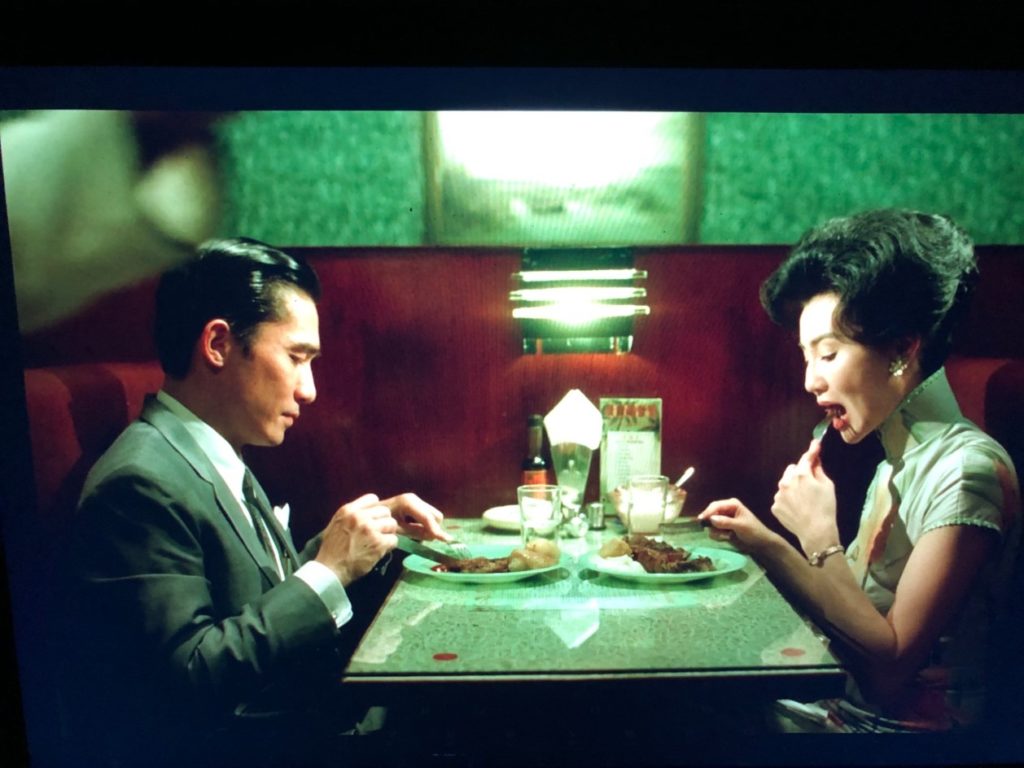
Intimacies of eating: “Order for me” and “Do you like it hot?” Mr. Chow and Mrs. Chan sit down for their first meal together.
focus on faces
shot-reverse shot exchanges
over potatoes and steak
we develop a taste for
mustard spooned slowly
onto her plate
offscreen disembodied voices
walk-through cameos
martial arts serials
all caricatures:
anyone who isn’t
Them
xi. Hollywood co-opts everything
I read somewhere that In the Mood for Love was director Sofia Coppola’s favorite film.
I’m not sure I’ve come to terms with the fact that this film isn’t just mine.
It makes us crave intimacy, ownership, holding it in our palm. It wants us to want to ourselves.
Maybe it’s predictable to be entranced by this film’s pornography of longing, but still I am.
xii. a restless moment
everything a rehearsal for the end, our parting, some death
sometimes it seems a remake of Alain Resnais’ Last Year at Marienbad
sometimes it’s just irresistible cinema poetry
xiii. I wonder how it began (echo)
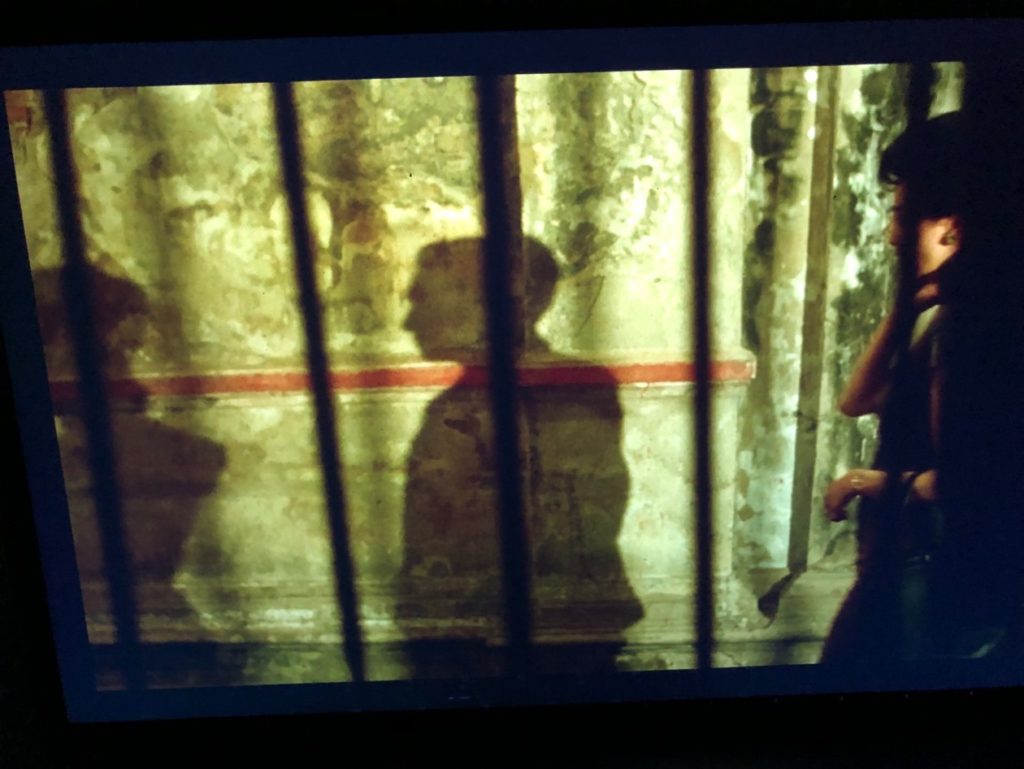
Seeing in double, never alone. Mrs. Chan and Mr. Chow (off-screen), haunted by the shadow spouses whose indiscretions they discover and reenact.
two shadows walk ahead of them in the frame
their doubles, adulterous spouses alive
in their absence
back of a cab in the rain
a film noir, the crime:
falling in love
first as tortured reenactment
and twisted revenge
then accidentally and actually
their undoing
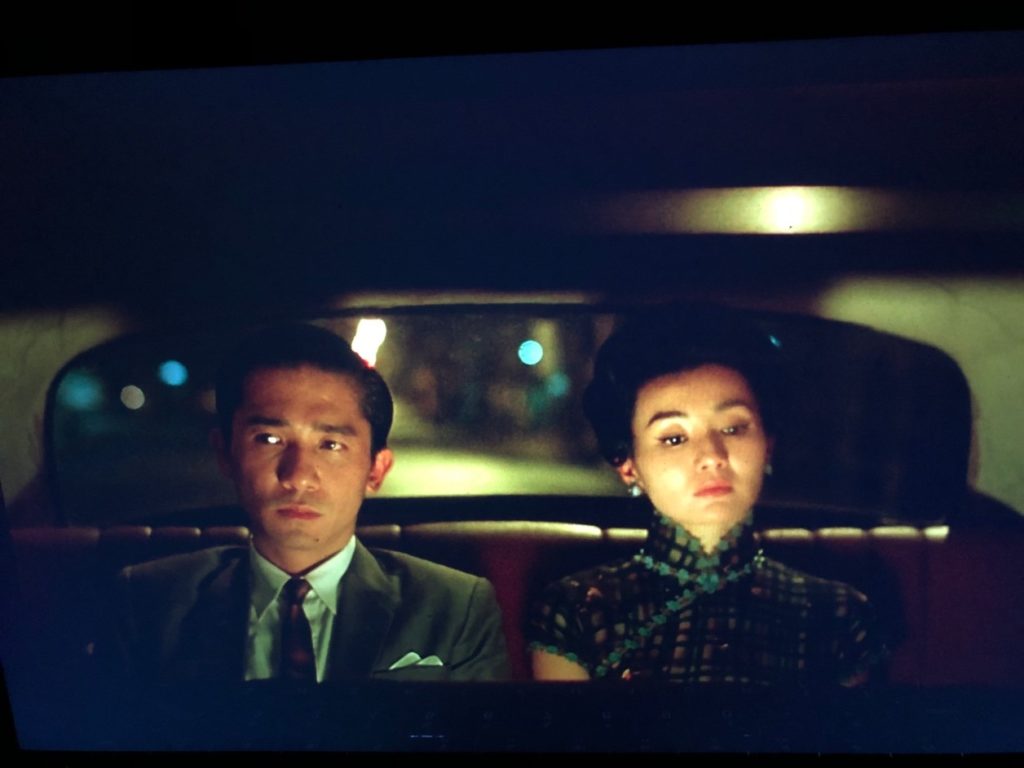
Back seat possibilities and regrets.
xiv. the past is something you can see but not touch (horizontals and verticals)
voyeuristic peeks over shoulder
through doorways and windows
down long hallways
witness to intimate unspoken fragments
slow motion ballet of bodies ascending
and descending a staircase
somewhere between Ozu and Antonioni
the camera eye that frames and lingers
inevitable rhythms of that string suite
a heartbeat of slow-motion pans across dark streets
our lovers hesitate
breathe in and out
in and out
desire moves in strange ways
cannot be spoken or explained
embodied in small gestures
her hand gliding
along a wall
across a banister
his hands and eyes
caressing stone
like a body
in those final frames
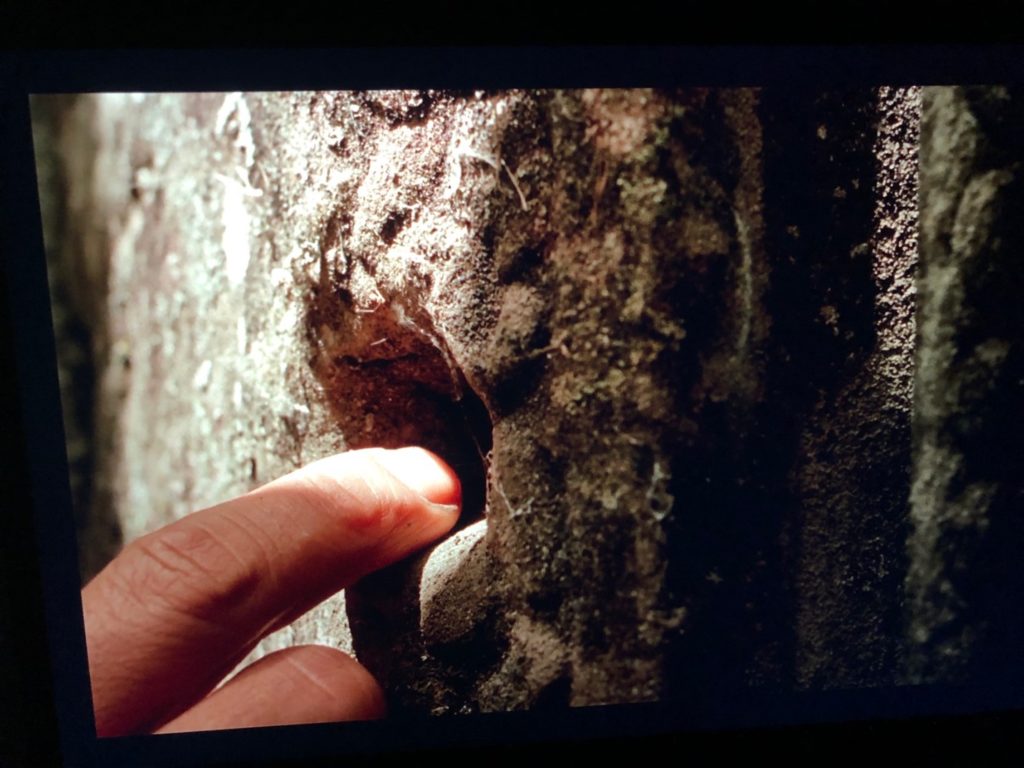
In the end, the beginning. Mr. Chow (Tony Leung) extends a single finger into stone wall at Angkor Wat. An erotic-nostalgic mirror of his opening gesture of ringing the doorbell.
xv. coda: cinema dreams
Alone with myself in that musty theater, age 24, this film was therapy.
I’d fallen in love and had lovers, but those rarely intersected.
This film helped me dream: I loved and lost and found myself again.
Edited by Olga Tchepikova-Treon

Pingback: Movie Stars, Maggie Cheung, and The Heroic Trio – Perisphere
“I’m not sure I’ve come to terms with the fact that this film isn’t just mine.” Thank you, Casey, for this essay and thank you Trylon for screening the film last night (May 8.) Been in love with this movie for 20 years and this poem helps me understand why.